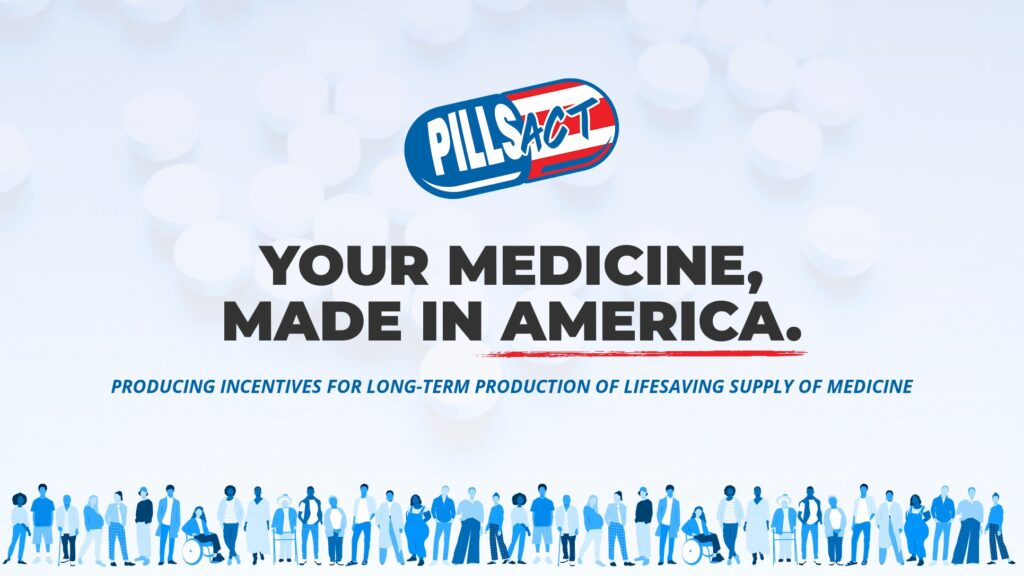WASHINGTON — The Coalition for a Prosperous America (CPA) today applauded the introduction of the Producing Incentives for Long-term Production of Lifesaving Supply of Medicines (PILLS) Act by Congresswoman Claudia Tenney (R-NY) which would incentivize the strategic reshoring of U.S. domestic production of generic medicines with a domestic production-based tax credit, domestic content bonus credit, and an investment tax credit.
Importantly, the PILLS Act would address the national health care crisis due to ongoing, and worsening, shortages of essential lifesaving generic drugs—a crisis that has been exacerbated by decades of offshoring our nation’s generic drug manufacturing capacity and a growing dependence on foreign manufacturers and supply chains.
Earlier this month, Dr. Robert Califf, commissioner of the U.S. Food & Drug Administration, warned that “there’s not enough reserve and supply” of generic drugs and “there’s too much at stake when shortages occur.” Additionally, Commissioner Califf called for additional policies to boost domestic production of generic drugs, arguing that “the economics of the industry” needed to be fixed.
For more information on the PILLS Act, click here.
“In recent years, drug manufacturing has shifted away from the United States, threatening American jobs and the security of our vital medicine supply chains,” said Congresswoman Tenney. “To bolster domestic generic medicine production and guard against future supply chain disruptions, I introduced the PILLS Act to incentivize businesses to produce these important pharmaceutical products in the United States. This legislation is a crucial step to not only re-shore drug production, but also to strengthen our domestic supply chains and create American manufacturing jobs.”
“The PILLS Act is an incredibly important bill that would create massive incentives to strategically reshore U.S. domestic production of generic medicines,” said Zach Mottl, Chairman of the Coalition for a Prosperous America. “Our country is facing a national health care crisis due to ongoing, and worsening, shortages of essential lifesaving generic drugs, which account for roughly 90% of all prescriptions dispensed in the U.S. Currently, the U.S. is dangerously dependent on foreign manufacturers—particularly in China and India—for essential, lifesaving generic medicines. Since 2002, imports from India have increased 35x, while the floodgates have opened to allow imports from China to rise to an astounding 165x their 2002 levels. This should sound alarm bells through Washington and highlight the need to pass the PILLS Act in order to address the shortage crisis and rebuild America’s domestic production of generics, antibiotics, and other key medicines.”
Background
Generic medicines account for roughly 90% of all prescriptions dispensed in the U.S. They are critical to our nation’s health care system, including the hundreds of millions of Americans that rely on them every single day. Unfortunately, our nation’s supply of safe, quality generic medicines is facing serious risks.
Currently, the U.S. is reliant on imports for at least two-thirds of our generic medicines, and nearly 90% of generic active pharmaceutical ingredient (API) facilities are overseas. The majority of those supply chains run through China and India. According to U.S. government data, U.S. pharmaceutical imports have skyrocketed in the last ten years, with imports from China, India and Mexico leading the surge. India and China are increasingly the leading U.S. source for generic pharmaceuticals and account for 85% of new API filings.
A report issued by the Inspector General of the U.S. Department of Defense stated that U.S. reliance on foreign medicine sources is a national security threat. China now accounts for 95% of imports of ibuprofen, 91% of imports of hydrocortisone, 70% of imports of acetaminophen, and 40–45% of imports of penicillin.
According to Food and Drug Administration (FDA) data on drug shortages from 2015 to 2022, drug shortages have shot up to an eight-year high. Recently, FDA inspectors have found significant violations at foreign manufacturing facilities. A Bloomberg report published in April documented the rising dangers of India’s generic drug industry, including that “India is scandalously short on regulatory oversight” and that “[i]n the last six months alone, its generic cough syrups have killed dozens of children, its eye drops have caused blindness and its chemotherapy drugs have been contaminated.”
The U.S. once led the world in pharmaceutical manufacturing. Today, however, our nation’s ability to manufacture the most basic essential medicines domestically is severely crippled. Our nation’s overdependence on foreign production has left America vulnerable—both from a national security standpoint and a public health and readiness perspective.













